#insurgency after conquest
Explore tagged Tumblr posts
Note
I notice a certain pattern when reading academic scholarship, and I wanted to ask if you see this too, that goes more or less like this: "X people were indifferent to being conquered by Y, because very little changed to them in regards to how things were under the rulership of their previous overlord Z, so it was business as usual. In fact, X people might actually have welcomed conquest, because of less taxes, less persecution, or [insert motive]".
I tend to find a lot of this regarding Alexander's conquests especially with Egypt, but with other Asian regions too. (I also read a lot of this regarding the Roman takeover of Egypt, arguing the people were indifferent to the Ptolemies being overthrown). To the point were I see this becoming a trope of sorts? I'm not disputing that many were happy to see the Persians go, but I can't help but find the "people were indifferent to their rulers" approach de-politicizing and even reductive of the role the people played & their beliefs. I also wonder how much is propaganda to benefit the winners.
Winning the Hearts and Minds… e.g., avoiding insurgency after conquest
An interesting question, and observation, but I fear it may be projecting modern assumptions/ ideas (neither is quite the right word) backwards in time. First, I’ll list what some of the accidental assumptions are, then delve into them. But this is a good question in that it lets us discuss some quite fundamental differences between then and now.
First, it can be easy to forget (because it’s hard to imagine) how little information about the larger world the average person had, especially when living away from urban centers.
Second, the query perhaps over-assumes the political impact individuals could have in most areas. Obviously, this varied.
Third, the role of religion—and perceptions of who has the approval of the gods—shouldn’t be underestimated in who wins/loses and general acceptance of the outcome.
Fourth, what probably affected people most were immediate impacts from combat itself. This, again, would have varied, depending on how close one was to the conflict (or invading army). If caught in the middle of it, it could be absolutely catastrophic, from death to rape to destruction of homes/fields, to later starvation when armies requisitioned your winter stores, etc. (I find this detail is often overlooked in analyses.)
These are each relatively complex things that I can’t go into in detail, but we can take a closer look at each. That said…I tend to agree with those assessments referred to in the ask. For the average person not near the locus of combat/disruption, they probably experienced relatively little change in their day-to-day. Therefore, they may not have cared. But that is a very broad generalization that must be tweaked depending on various factors, not least “who” was the victor. For instance, Alexander changed prior (Persian) administrative structures relatively little. But the Ptolemies could be ruthless in taxes, especially outside Alexandria. Earlier, Persia had definitely been a lighter overlord than the neo-Assyrians or neo-Babylonians. There was a reason every time a new Assyrian king came to power, the provinces rebelled.
Let’s start with Point One: people, especially in rural areas, might not know much of what was going on in the “wider world.” If travel in antiquity was more prevalent than many modern people assume, travel was also a perk of wealth. And travelers tended to show up in/pass through urban areas where they could find lodging, or in seaside towns. That meant news was slower than a snail in the hinterlands. I’m quite sure there were places in Persia that didn’t even realize Alexander was there until months, perhaps even a year or more, after he’d moved on!
The ancient world was a rural world. Even at the height Rome’s power, only (maybe) 40% of the population lived in urban centers. Compare that to 83% of the modern US population living in urban centers, 84.5% in Britain, and—for contrast—65% of the Chinese population, and 74% of Russia. But 92% of the Japanese do.

In short, throughout most of antiquity, more people did NOT live in cities and may have seen only a handful of foreigners in their lives. They rarely moved more than 5-10 miles from where they were born.
This is important to understand, when it comes to reactions to a change in “overlord-ship.” They probably rarely/never even saw the “overlord.” It would have been locals who assessed and collected taxes, then took those taxes to be paid. Also, remember that quite late, many taxes were still paid “in kind.” E.g., in non-monetary forms.
So that may help set the stage for why historians say the average person probably didn’t notice a lot of change—or care. Unless there was a sharp shift in how high taxes ran.
That brings us to Point Two, about the impact of individuals on political structures. In MOST places, the average person had little-to-no say in politics. Even in some of the democratic poleis of ancient Greece, much of the voting was done by urbanites, not rural farmers. And there were many more rural farmers. This is the opposite of the US today, where one big complaint about the US Senate, with 2 senators per state—not based on population—is that it gives an outsized voice to swathes of very rural and unpopulated areas. But that system was created in an age when rural areas were much more populated. They are not about to give up their statistical advantage, so altering the Constitution to fix it after 200+ years of change is out of reach.
And that’s just in the democratic poleis of Greece, such as Athens. Outside of Magna Graecia, democracy was a unicorn. Even Rome was a republic. In Lydia, in Persia, in Egypt…yeah, no.
That said, a couple other areas do suggest greater “citizen” input, and these are peoples who famously resisted Alexander: the Scythian groups of the Steppes, the Sogdian and Baktrian populations, and especially the independent tribes/populations of the S. Indus River areas. Alexander cut a bloody swathe down the Indus because the people. Would. Not. Submit.
(This is an area of Alexander studies, btw, that I think needs much more research, but requires reading not just Alexander sources, but Indian ones as well, and weighing the historiography of each. There’s an unfortunate divide that’s largely a function of geography and language in the modern world. It’s not dissimilar to the issues with Mesopotamian sources on Alexander, but in that case, not many ANE/Mesopotamian sources have survived. India is much richer in evidence, I understand. A new book IS due out soon from Brill: How the Brahmins Won: from Alexander to the Guptas. Being Brill, it won’t be something flaky. But, also being Brill, it’s godawful expensive: $228.)
Anyway, resistance to conquest by Alexander or anybody else depends on the POLITICAL structures of the place conquered. So the Greeks resisted Macedon generally. They were used to making their own political decisions. In contrast, areas of Persian that weren’t accustomed to independent rule accepted a change in ruler more easily. But once you get further east (and north) that changes. Also, in Italy, it would have been difference. And certainly, Rome experienced LOTS of problems dealing with the Germans! And Celts/Gauls before them. Egypt also typically resisted because while it had a god-king, it also didn’t like foreign rule. They resisted Alexander less because they knew he’d go away again, and he got rid of the Persians. But in the end, they got the Ptolemies who weren’t any better (and arguably worse).
So Alexander had something of an advantage moving into areas that were largely not accustomed to a great deal of autonomy in rule (with some select exceptions).
This leads into Point Three, the role of religion in ancient warfare. For many ancient peoples, the ones ruling them had that role by “divine right.” This concept of a divinely chosen king is very, very old in Mesopotamia. The earliest Sumerian texts talk about kingship first descending on Eridu “from heaven.” If this sort of divinely selected kingship isn’t as extreme as Egyptian notions of pharoah as a living god, most areas Alexander marched through had such ideas. “As above, so below.” Ergo, victory in war indicated victory in heaven and divine favor. Alexander winning meant the gods were on his side. Who’s going to argue with the gods?

Yet it's also typically religion (or higher taxes/mistreatment) that drove resistance, resentment, or rebellion against a new king/conqueror. This is WHY Alexander was generally very careful in his respect for local gods and religious practices. Actions by the one conquering could reverse a perception that the gods were on the conqueror’s side. For example, the Persians might have been more inclined to accept Alexander if he hadn’t torched their ceremonial city with its fire temples, etc. He really had no idea what he was doing, and his message was half for Greece anyway. But he lacked a real grasp of Persian symbolism and so, put his foot in it. He’d been much better handling Egypt.

In any case, when looking for ideological reasons for resistance, that would come from religion more than political theory, at least in most places.
And finally, Point Four. What is most likely to generate resistance is when an invading army causes LOSS. This loss can be very literal: as in loss of life, loss of property, or destruction of farmland and with it, livelihood. Or it can be a bit more theoretical, as in loss of (prior) independence, loss of potential trade and trade markets, or threats to alliances that benefit the people.
Resentment owing to death and destruction of towns is fairly straightforward. This is why, when a people choose to resist, Alexander, the Romans, the Assyrians earlier, etc., may enact quite shocking (to moderns) executions of whole populations: certainly of menfolk down to children, but sometimes of everybody (the Romans were noted for that). They know that X people won’t ever forgive them, so they elect to eliminate the problem for at least a generation, or they just exterminate the people altogether and use the land to reward their own soldiers or allies. A lot of the land the Roman consul Marius passed out to his soldiers was just such war-booty.
But there are other, less obvious forms of loss that generate resentment and rebellion.
For instance, armies march on their stomachs, and until recently, invading armies typically ate off the land. This is why Memnon’s proposed strategy of burning crops to freeze-out Alexander when he first invaded would have worked. He had only about a month’s rations. Yet Memnon’s advice to burn the fields wasn’t taken precisely because it would have devastated the farmers in that region of Asia Minor: destroying their stores for the coming year (as well as taxes due). Local satraps would have had to pay to import food to replace the loss, or let their people starve.
They elected to ignore Memnon instead, and, well, the rest is literally history.
Ancient armies couldn’t bring supplies far for a variety of logistical reasons. If the army is simply passing through and they’re wealthy enough, the impact on the locals may not be that great: e.g., they don’t deplete the needed stores and pay for what they take. But if they aren’t rich enough (and even sometimes when they are), they just take it. If they wind up stationed in an area a while, the burden becomes too great on the local populations. The army is, well, an army. With weapons. Locals have a choice: resist and die now or give them food and die later from starvation. This is precisely why resistance wasn’t necessarily immediate; people hoped X army would leave before their storage hit critical lows when fighting back became the only option.

This is one reason you’ll read especially in Alexander’s early campaigns that he grants this or that town or place exemption from taxes. He doesn’t want to anger the locals who are providing him supplies. (Not always with pay.) He was also able to avoid resentment in many cases just because he never stayed put long. But when he did stay a while, as at Tyre, it created logistical difficulties.
This is the sort of detail our histories don’t dwell on much, so we’re not always sure how armies are getting supplies, or it’s tucked away into the corners of other descriptions. “The so-and-so people sent gifts and rations…” etc.
Similarly, when armies or conquerors interfered with established trade ties, this could also arouse resistance…as Alexander found in Sogdiana. The people there wanted an open (permeable) border in order to continue trading (and intermarrying with) steppe tribes to the north. Alexander started out trying to impose a closed border with hill forts to police it. THAT is one chief reason for the rise of insurgency up there. The region wasn’t resistant initially once Bessus was removed. They even cooperated in his capture. Spitamenes turned over Bessus and made peace. But within a few months, the whole area was in open rebellion due to Alexander’s policies regarding the border.
It took marrying Roxana—and figuring out why they were fighting him—before he could march out two years after he entered. Generally, the further he got from areas already familiar to him, the more he put his foot in it.
I’ve been using Alexander to illustrate because his campaign is familiar to me, but these same general principles apply to any army and any commander. While some areas met invasion with resistance (by more than just the ruling class), much depended on the type of government already in place, as well as local views of the gods and war. The more absolute the style of rule, and as long as religious norms weren’t offended and exceptional demands not made, then yes, many conquered people didn’t necessarily care, and may even have welcomed a change in leadership.
#asks#Alexander the Great#resistance to conquest#insurgency after conquest#ancient warfare#conquests of Alexander the Great#Roman conquest#Assyrian conquest#warfare stressors on societies#war studies
18 notes
·
View notes
Text
Ordinary Days - 1
Away from the capital, Sylus leads the insurgency movement from the northern regions of the country with the help of a deer hybrid. Your presence made him all more convicted to his cause and when the war ends, he looks forward to the day you don't have to dig up sweet potatoes for breakfast anymore. A Deer Hybrid! Reader x Dragon Hybrid! Sylus Fic Summary: Gaining the favor of a war veteran to declare his support for the movement is difficult at is, much alone said war veteran is also your father. Tags: Sylus x Reader, Hybrid AU, Suggestive Themes, Fluff, Predator/Prey, Implied conflict Word Count: 977 words Author's Note: Title is based on a fan comic by Silver from Pixiv. This isn't a series (yet) but more of a collection of snippets while I figure out how to outline this concept and I thought maybe I should share what I have while I am at it. Had elements from both Love and Deepspace and Arknights with some of my ideas blended in. Anyways, enjoy!
Favor, Not Easily Obtained
Patriot.
It is a title your father is most infamous of and Sylus grew up in the halls of Imperial Palace at Deity Grypherburg, the capital of Ursus, with that title spoken reverently even by high ranking officials themselves.
Unmatched.
Unparalleled.
Indestructible.
Your father led the Ursus Imperial Army to victory against many of its conquests several times without fail and you would be a fool to not run away when you see him from a distance leading the march, the antlers on his head coupled with his imposing stature is enough to make a rational man turn and go back from where they came.
(Irrational ones will only realize they are on the losing end once the halberd of your father flying all the way from the other side of no man’s land pierces them right on their faces.)
Beloved hero of Ursus.
One would have thought the man would be at least amicable to be around with based on the tales that Sylus heard from the nannies that looked after him before they tucked him for the night coupled with the images he saw in books and in the paintings at the royal barracks but no-
-Your father is without a doubt, the most overbearing man he has ever met.
The old guard had never once spoken a word to him the first time you have introduced them to each other (Sylus would never understand how you don’t see the need to mention that your father is the war hero every citizen in Ursus loves on your way to the village where you live the first time you met) and even when they were here in the freezing tundra fighting side by side in a civil war that will make or break the country, the closest conversation Sylus ever had with him was a grunt.
A grunt.
That’s basically it.
Sylus had heard him talk to the soldiers and even the other villagers, his voice soft and replies clipped apparently because of his damaged larynx, and it will only increase volume when he is barking orders but to Sylus?
The least Sylus can get is a finger pointing to a pin on the map before reconnaissance and the best is a grunt.
Initially, Sylus does not see the need to bring this up to you because he doesn’t want you to play mediator on this matter, not when you already are between him and the common folk.
He had been educated well enough to know that you can earn the support of a battleworn veteran through action and that means-
-A demonstration of his military intellect and strength.
Even then, your father’s overbearing presence and scrutinizing gaze did not only stay in the battlefield but also in the village doubling as camp as well.
“Is there something bothering you, your highness?”, you asked, pausing from mending a tear on his coat, and Sylus only shook his head, wrapping his tail around your waist while simultaneously pulling you closer to his side.
The laughter of the children playing with the soldiers, the cackle of the bonfire, and the faint scent of food from the kitchens being prepared wafting all the way here was almost enough to soothe his worries regarding the possible outcomes of this civil war.
Almost enough because-
-He doesn’t have to turn around to see that your father’s eyes are trained at his back.
Word has it that your father deserted the Ursus Imperial Army for what the elites have done to your older brother and that distaste extends to anyone, anyone who is born with a golden spoon in their mouth which unfortunately, includes him.
It would take tremendous effort for the war veteran to support his cause and even more for Sylus to convince that he, the bastard prince of the Royal Family, does not see you as a passing fancy but something more.
Afterall, Sylus is more motivated than ever to reshape the country just for you.
“Didn’t I tell you there is no need for formalities, little doe?”
“Old habits die hard, your highness.”
“Then maybe I should help you practice saying my name, sweetheart.”
The tips of your deer ears always turn red on such comments, a shy smile on your lips, and Sylus was about to rub his horns against your antlers in amusement, a little routine between the two of you, when he heard the all too familiar grunt coming from your father observing you both from a distance-
-No, it wasn’t a grunt but a huff.
A huff of disapproval.
That’s new.
Yet, always the oblivious girl that you are, you continued what he is about to do instead and told him ‘If your highness try not to wound himself often, I’ll consider it’ then amidst the falling snow and the cold stare of your father, the kiss you placed on his cheek and your warmth that stayed on his coat with tears already mended superseded all of his worries.
It only occurred to Sylus as he followed you to the kitchens that it was the first time you did that in front of your father.
“I can beat up the prince for you, old man.”
“My daughter- Too naive-,” your father sighed, then turned to the one who spoke, a rabbit hybrid (The little girl you and your father picked up while you travelled to the northern regions of Ursus, now in her teens), “And you- Too rowdy-”
“Rowdy enough to punch his face just in case he breaks big sister’s heart.”
The war hero did not comment any further.
After all, he is still yet to declare his support to the young dragon’s cause and-
-He has not seen enough if this estranged prince indeed cares for you or if he is just like the bourgeois he had left behind in the capital.
────────────────────
Author's Note: Big shoutout to @cygnuusss and to my friends for enabling me to write this. Once I am done writing the side story for Luke and Kieran, I will most likely move to this but for now, I'll probably keep posting these drabbles here and there. As always happy to share this with everyone here.
#love and deepspace#lads#lads sylus#love and deepspace sylus#lads hybrid au#hybrid au#sylus x reader#sylus x you#arknights#arknights patriot#arknights yelena#arknights frostnova#she just appeared briefly
68 notes
·
View notes
Text
Is Ryloth based on Algeria?
A while back, some friends and I had an interesting discussion about why Star Wars has the Twi'lek speak with French accent, and the implication that Ryloth could perhaps be inspired by a country formerly colonized by France.
We discovered there were A LOT of parallels between Ryloth and the country of Algeria

Political History & Colonialism
Algeria became a colony of France after they invaded it in 1830. Their conquest of Algeria has been called a genocide, and they perpetrated countless atrocities- starvation, epidemics, retaliation for resistance, etc. During that time period, there were popular revolts against the French occupation, and insurgent groups, guerilla warfare, etc., particularly in the decade prior to their independence, which Algerians finally won in 1962.
Ryloth's rulers/most powerful political official(s) are always shown as off-world, corrupt, disconnected from the life and struggles of its people, and allowing the people and resources of the planet to exploited. First, this is under Senator Orn Free Taa, then Separatist occupation, then the Empire.
Throughout that same history of oppression and exploitation, we also see armed resistance movements and guerilla fighters, like the Twi'lek Resistance and the Free Ryloth Movement.
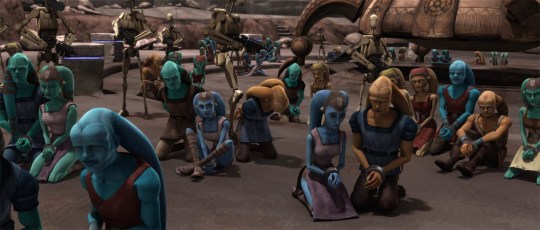
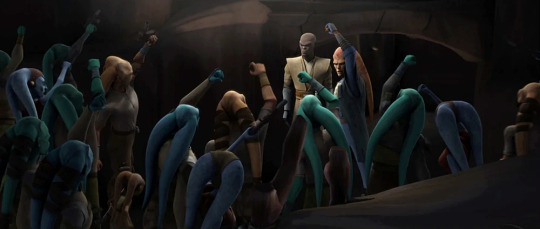
Geography
Algeria is the largest country in Africa. It contains a significant portion of the Sahara Desert, and hosts many impressive rock formations.
Ryloth is a large planet on the Outer Rim. Whenever we see Ryloth on-screen, it almost always shows the desert, is peppered with incredible rock formations, gorges, etc.


Architecture
The homes and structures we see on Ryloth are reminiscent of traditional &/or vernacular mud-brick architecture in Algeria and its neighbor, Morocco. For example:
The Syndulla House
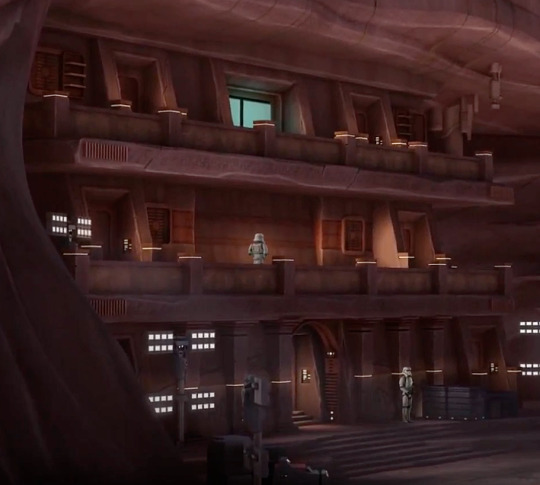
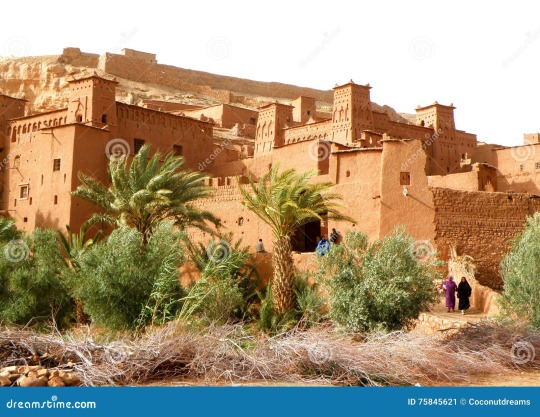
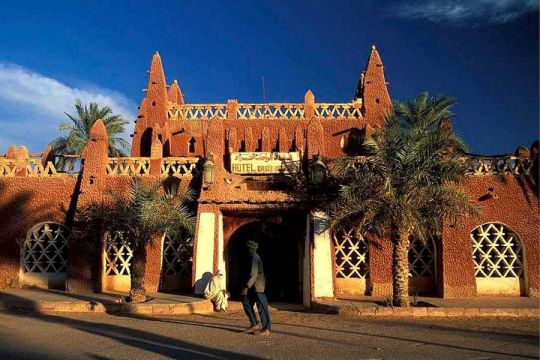
Numa's Village (from The Clone Wars S1E20)

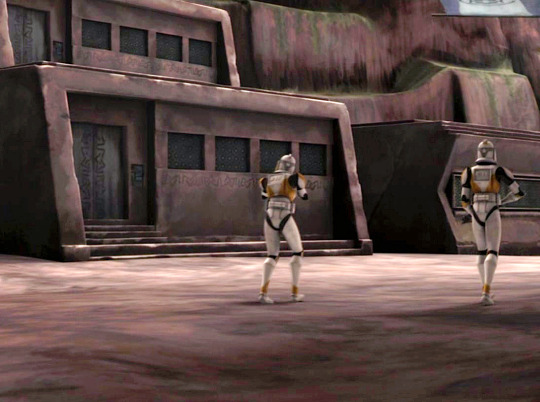
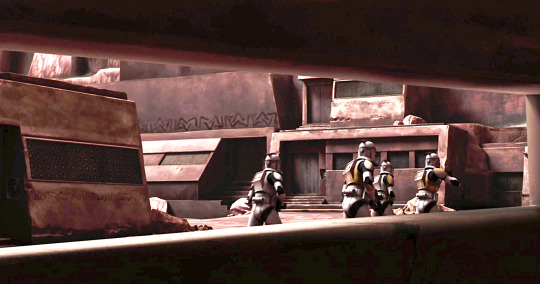
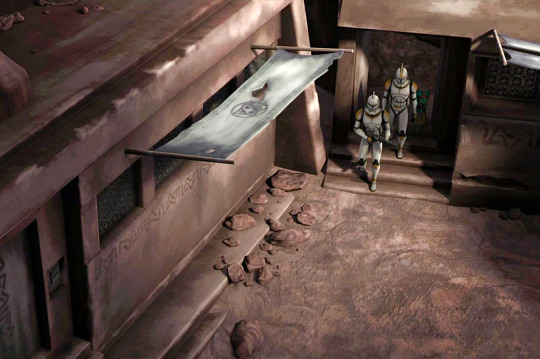
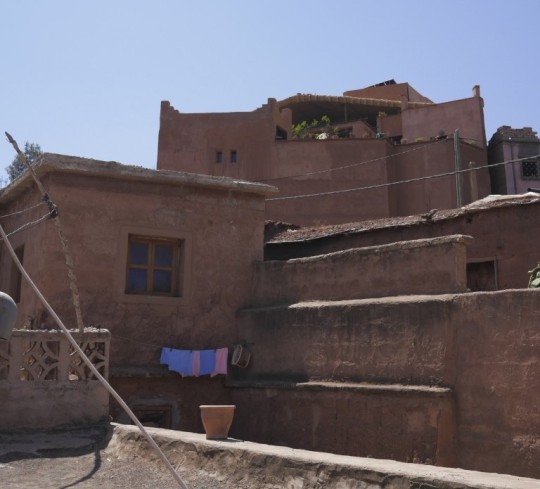
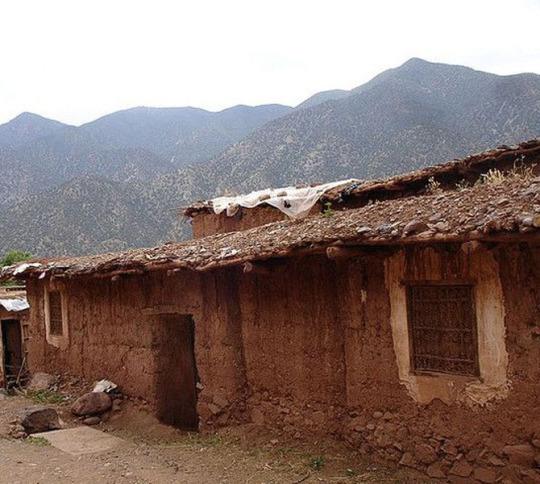
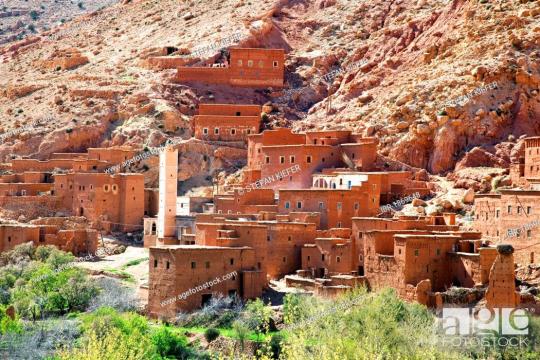
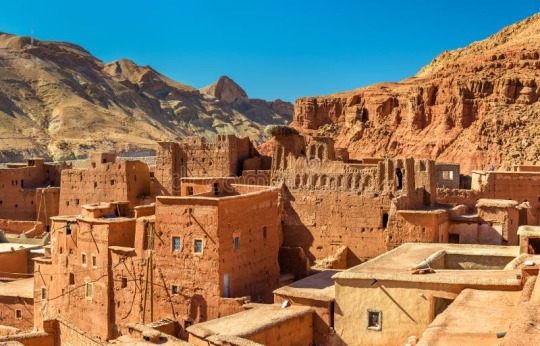
The Capital City (from The Clone Wars S1E21)
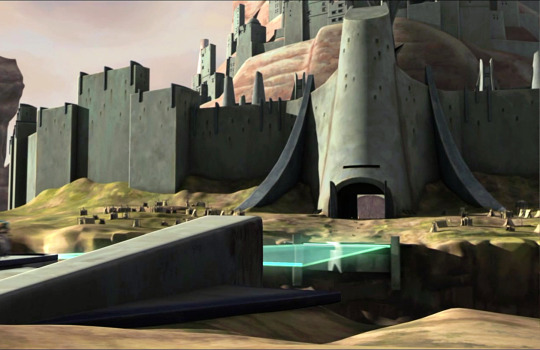
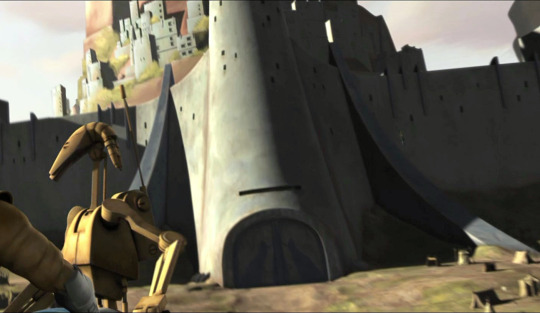
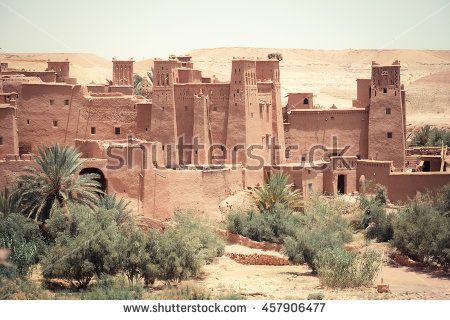
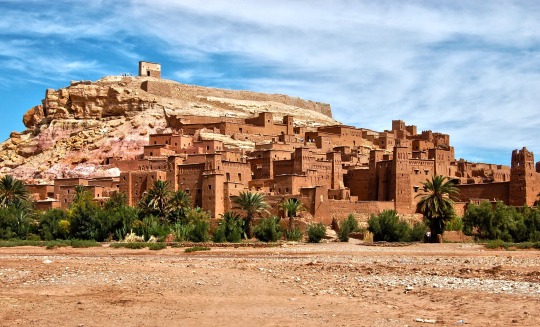
Interior Design
We also see themes and details that are strongly reminiscent of Islamic architecture in, for example, the design of the Syndulla family's home.
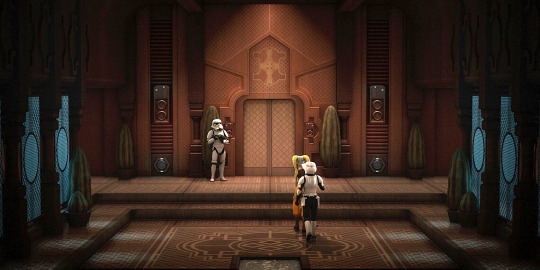

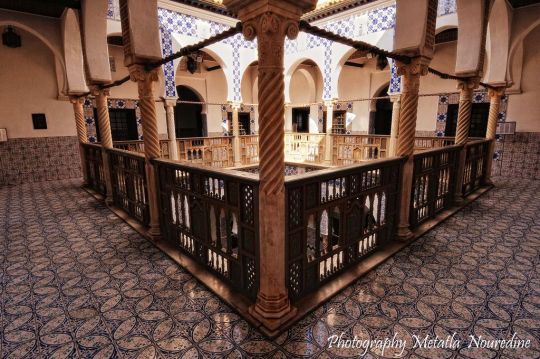
This is also true of simpler homes, like the ones in Numa's village from The Clone Wars, which utilize subtle geometric motifs and Arabesque patterned windows.
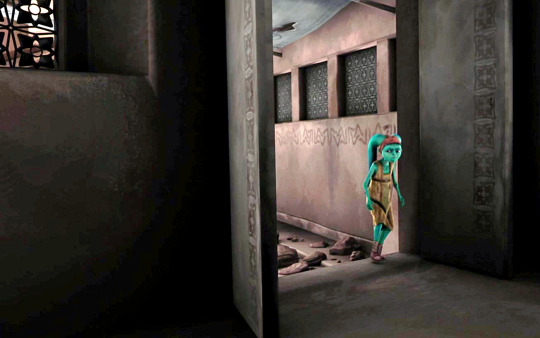
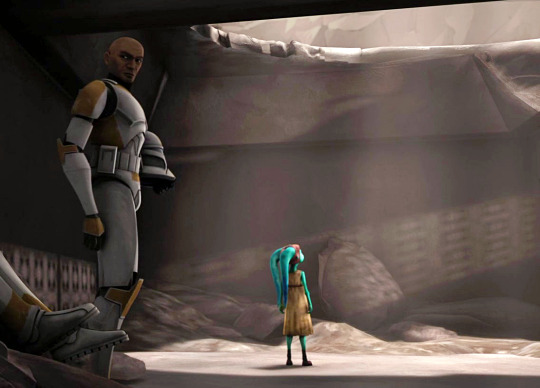
Art
Mosaic art was one of the hallmarks of Roman and Byzantine and Islamic Empires, all of which Algeria was part of, and had their history and culture influenced by.
The Syndulla family portrait is a mosaic.
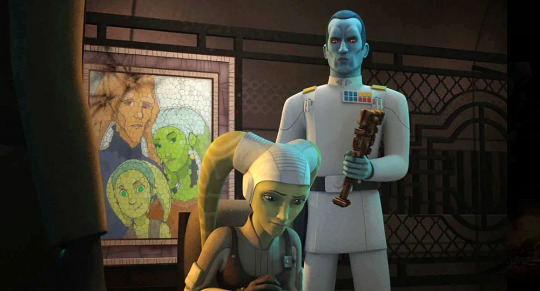
Head Coverings
The vast majority of Algerians identify as Muslim. It's very common practice for Muslim women to wear the hijab, which covers their hair.
Every time we see a female Twi'lek on-screen she is wearing a head-band or head-covering. We very rarely see male Twi'lek do so.

Language and Accents
As a remnant of the legacy of French colonialism, French is widely spoken and understood in Algeria, though its official language is Arabic.
Many Twi'lek speak Galactic Basic, and do so with a French-sounding accent, though Twi'leki is their native language.
Anything else?
#sources are basically just Wookiepedia and Wikipedia and my useless college degree lol#i did my best but i'm no expert so please correct me if my terminology etc is wrong!#star wars#twi'lek#ryloth#star wars meta#sw meta#sw numa#hera syndulla#star wars rebels#the clone wars#sw rebels#mine#it's not a PERFECT parallel but it's still pretty close as these things go
160 notes
·
View notes
Note
It's sad how many people simply ignore Fates' worldbuilding, because it really shows how Hoshido isn't an innocent nation. Think about the idea of killing the Nabateans and their remains used for powerful weapons, now think about how the Kitsune are hunted by Hoshidans for their fur to the point they kill any humans who enter their territory. Hell, killing humans is treated as a game by them as a result.
All throughout the later half of Birthright, we hear about Hoshido's defenses falling all the way back to the capital. We actually see it in Conquest, but it still happens in Birthright while Ryoma runs around trying to stir up Cheve to fight Nohr like the CIA and bailing when he gets caught. Once again, we see the aftermath in Conquest, just like the aftermath of the Hoshido Siblings attempting to capture Garon at the opera in NEUTRAL territory. They did the same thing Zola did in Conquest. You get Ryoma stealing medicine for Takumi, but then using the medicine to try and force Corrin into returning to Hoshido. And then there's the whole thing with Shura's homeland, where Hoshido abandoned it's allies to side with the guys who conquered them.
Conquest is meant to undermine Birthright, which ends with Hoshido being completely unaware of a bigger threat. Even then, the underlying problem hasn't been dealt with and no guarente this won't happen again. There's a reason why it's not a good route and an evil route rendered pointless by Revelations, it's two flawed routes that fail to address the real issue and one route that leads to both sides working together to actually end the threat or as Corrin puts it "end the night".
Were I to venture a guess, I'd say it has to do with black-and-white perceptions of innocence and morality. People think the be all, end all of being a pretty shitty nation is just invading other lands and killing their people, but it's really not.
As you say, Hoshidans have a lot of black spots on their records. Coericion (Ryoma with the medicine), a king neglecting his citizens by foolishly trying to find the easy way out (Ryoma with Cheve), breaking pacts with neutral territories (Cyrkensia), provoking insurgence (Cheve again), ignoring refugees (Shura), and-in a JP exclusive line from Azura iirc-annihilating anyone who has a connection with Nohr after Corrin breaks away from Hoshido.
The biggest one though, is the rampant isolationism and xenophobia, both which fuel each other heavily. They have such an excess of resources that lots of it start to spoil or expire, they don't concern themselves with the outside world beyond what can help maintain their own sense of peace, and have perceptions that Nohr is full of selfish monsters. That's why part of Birthright's core messaging is "peace can't last without acknowledging that others need our help, we can't act as if we can keep to ourselves anymore."
I like how you ended your ask as well, I enjoy the "end the night" aspect of Fates' dialogue, especially since the JP names of the kingdoms are "Midnight Sun Kingdom" and "Dark Night Kingdom", as both kingdoms have flaws, thus being 'in the dark' about the truth, and never fully overcoming it, yet still managing to work within it. In contrast, Valla, the "Invisible Kingdom" provides 'clarity' by removing the threat that becomes visible once you change your perspective, a la Hoshido and Nohr not antagonizing each other anymore.
22 notes
·
View notes
Text
Ruth Michaelson at The Guardian:
The Syrian president, Bashar al-Assad, is believed to have fled the country his family has ruled over for 50 years as rebels said they had captured the capital after a lightning advance completed in just under two weeks. Two senior Syrian officers told Reuters that Assad had fled Damascus, his destination unknown. The report could not be independently verified. The senior Emirati diplomat Anwar Gargash declined to say whether Assad was fleeing to the United Arab Emirates. “When people ask where is Bashar al-Assad going to, I say, you know, when you really look at this, this is really at the end of the day a footnote in history,” he told reporters at a conference in Bahrain. The Syrian leader had been publicly absent as Islamist militant insurgents spearheaded a sweeping offensive that began in a small enclave in north-western Syria, and within 11 days appeared to have toppled Assad’s rule.
In their first announcement on state television following the offensive that took the world by surprise, rebels said they had ended Assad’s 24-year authoritarian rule. A group of people were shown at the state television news studio, with one reading a statement from the “Damascus conquest operations room” announcing “the liberation of the city of Damascus and the fall of the tyrant Bashar al-Assad and the release of all the unjustly detained from the regime prisons”, calling on fighters and citizens to safeguard the “property of the free Syrian state”. Syria’s army command notified officers on Sunday that Assad’s regime had ended, a Syrian officer who was informed of the move told Reuters. But the Syrian army later said it was continuing operations against “terrorist groups” in the towns of Hama and Homs and Deraa countryside.
Rebels said they had freed prisoners from Damascus’s notorious Sednaya prison, regarded as a symbol of the Assad regime’s brutality, while video from Damascus showed a man climbing on top of a hospital sign to tear down a poster of Assad’s face. In the capital’s central square, people climbed on top of tanks and cheered as they trampled on a toppled statue of Assad’s father, Hafez, AFPTV images showed. In Syria’s second city of Aleppo, claimed by insurgent forces just one week before, celebratory singing broadcast from the speakers of mosques was interspersed with the sound of ululating and cheering ringing out across the rooftops. The Assad family have ruled Syria since 1971 when Hafez al-Assad seized power in a military coup, before his son Bashar inherited the presidency in 2000. Their control of the country was enforced through a vast security state, crushing dissent through a broad network of detention centres and government surveillance.
The tyrannical Assad regime in Syria has come to a close, as Bashar fled Syria.
See Also:
HuffPost: Syrian Government Falls In Stunning End To 50-Year Rule Of Assad Family
10 notes
·
View notes
Note
Could you elaborate on when Israel was legitimately under threat of conquest? I thought they were always militarily superior?
In recent years yes, but they didn't started that way. They double+ did not start that way in 1948! But it does require clarification. The Arab-Israeli war was intensely lopsided:
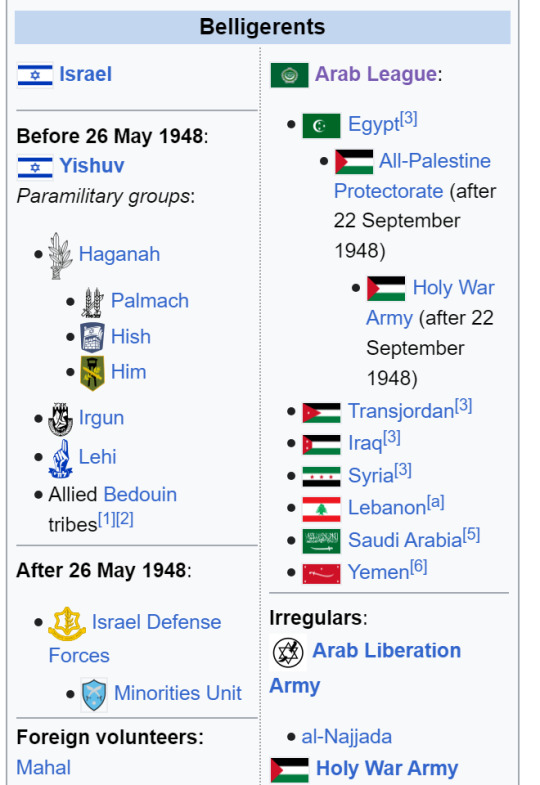
The population of the countries arrayed against Israeli was easily 10 to 1; with far more equipment and resources at their disposal. And while how much of this was rhetoric vs reality is intensely disputed, the Arab League put out many statements for public consumption of their intent to expel the Jewish population and ~maybe kill them all, so given the lopsided numbers and the rhetoric of ethnic cleansing you can see how this war would be seen, both in Israel and abroad, as existential.
Now, it turned out in this conflict the Arab states were a bunch of bickering idiots, far more invested to their selfish ambitions and personal vendettas, and commanding famously incompetent armies. They were highly non-committal to the operation; the tiny Israeli population actually fielded a larger army than the whole Arab coalition, and Jordan for example marched in, annexed, the West Bank, then promptly stopped fighting. So Israel won the war handily; but you really can't take this too far. If these countries ever decided to stop being incompetent morons, then it would be a very different story - their combined resources vastly overwhelmed Israel's, and the geography of Israel means that the moment they lose once, they can lose permanently.
And through the 1950's up until about the 1970's, that threat was ever-present. Both sides were intensely aggressive to the others and in particular Egypt & Syria continued to have strong political forces pushing for military action. They were frequently supported by the Soviet Union giving them arms & aid; at one point Egypt and Syria actually united as one country! The United Arab Republic, 1958 to 1961, and Israel was a strong motive for that union (though Jordan was more of one), only undone by a coup in Syria in 1961. Israel faced insurgent attacks on civilians sponsored openly by its neighbors all through the 1950's and 1960's, and fights three major wars against Egypt and sometimes Syria - in particular in the Yom Kippur War Israel suffers some its first major defeats at the hands of Egypt, showing their growing strength. At this point its not actually in the cards for anyone to 'remove' Israel, but Egypt & Syria still haven't recognized Israel as a country, so the tension is still very high. Israel does a ton of shit too ofc, taking sides isn't the point; you can just see that the situation is very tense, and Israel is up against countries that vastly outnumber it and are always one bad battle away from occupying the small country. This is only 'safe' if you constantly presume incompetence on Egypt, Syria, & Jordan's part; that isn't a safe assumption.
After 1973, however, the US and others help broker a permanent peace between Egypt & Israel, which culminates in the 1978 Camp David accords and Egypt recognizes Israel. They have been at peace since. Also fun fact, this is part of why the US gives annual blank check military aid to Israel - we give military aid to Egypt too, still do to this day! We essentially bribed them into making peace. But anyway, after this Israel never faces a real threat from a large state army; instead its all terrorist organizations in Lebanon and stuff like that. So in the 1970's through to the 1990's the Israeli security situation shifts from being surrounded by large countries actively organizing military operations against them to every single one of them abandoning that goal, and pushing for things like a two state solution in Palestine instead.
So to move to opinions, you can see how from 1948 to 1978, once the fallout from the formation of Israel is settled and you aren't gonna try to eliminate a sovereign nation because that is what we call a bad idea, there are going to be a lot of moments where you need to back Israel to keep the peace (like if the USSR is pumping weapons into Egypt, its the Cold War, you balance it). US policy towards Israel, alongside most European countries, is formed in this time around that dynamic. But in the modern era all these threats are gone - Jordan isn't going to try to conquer Israel, that is fucking ridiculous. But Israel still acts like that is a thing, like it needs "security space", and like its military isn't vastly superior and its neighbors aren't trying anymore to compete with that. And US policy is locked into indulging that.
25 notes
·
View notes
Text
A Reckoning for the Enemies of Democracy By ppatpat (u/Ramiorebokhara)
They came in shadows, slinking through the halls of power not by the grace of democracy, but by the corruption of deceit. They spoke in whispers, not with the voices of free men, but with the hushed tones of conspirators who dare not utter their true aims in the daylight. They infiltrated, manipulated, lied, and schemed—until, at last, the law came knocking.
This morning, justice arrived.
In a historic enforcement action, the Department of Justice executed Operation Kashmir, an unrelenting counterstrike against the Proletarian Unity Party (PuP) and their foreign masters, the so-called "Golden Consciousness." The result? Over 100 fraudulent accounts, exposed and eradicated, cast into the void where all enemies of democracy belong.
Make no mistake—this was not the censorship of dissent. This was the excision of a cancer. These people did not seek debate. They did not seek representation. They sought domination through deception, conquest through infiltration, and chaos through cowardice. And now, at the stroke of a Supreme Court order, their schemes lie in ruin.
The Insurgency
For four days, the Justice Department worked tirelessly, unmasking the network of frauds who had slithered their way into our democratic institutions. Their crime? Subversion. Their method? Deception. Their goal? The total collapse of SimDemocracy’s government.
They were not content to lurk in the shadows; they sought power. Through deceit and falsehood, they slipped one of their own into the Senate, not by the will of the people, but through the dirty mechanics of fraud. They built a network of alts, sock puppets, and coordinated disinformation—all with one aim: the destruction of SimDemocracy from within.
But today, the walls have closed in.
Acting under Emergency Counter-Terrorism Powers, Supreme Court Justice Sparty gave the green light. And with surgical precision, the DOJ purged their influence, restoring integrity where it had been so brazenly defiled.
And what, pray tell, do these charlatans do when exposed? Do they repent? Do they accept the weight of their failure? No. Like all cowards, they scurry into their holes and plot their revenge.
The Wailing of the Defeated
In an act of sheer desperation, these traitors—having been ripped from the institutions they sought to corrupt—now threaten a campaign of brigading, harassment, and destruction. Like the spoiled child denied his stolen toy, they now promise retribution against the very people they sought to deceive.
It is a textbook display of authoritarian tantrum-throwing. Having failed in their conspiracy, they now threaten a mob assault, hoping to burn the village after failing to claim the throne.
Let them try.
President Imade, recognizing the severity of the threat, has enacted a State of Caution—a preemptive measure to ensure that these ideological terrorists do not make good on their promises of sabotage. The Justice Department, already one step ahead, has begun intelligence-sharing with our allies in Voices of Democracy (VoD), who are now facing the same foreign-backed infiltration attempts.
The Hammer of Justice
Let this be a lesson to all who would undermine the institutions of free people. We have seen their kind before—liars who hide behind the mask of revolution, infiltrators who drape themselves in the language of justice while plotting the destruction of all who oppose them.
These people do not debate. They deceive. They do not govern. They scheme. They do not build. They corrode.
But they have failed.
SimDemocracy does not bend to fraudsters and ideologues. It is a democracy of laws, not liars. A republic of justice, not demagogues. A fortress that does not crumble at the first sign of infiltrators in cheap disguises.
Their attempt to steal power has ended. Their attempt to burn it down will be crushed just as swiftly.
The DOJ is watching. The administration is ready. The people stand united.
And when the dust settles, these frauds will be remembered not as revolutionaries, not as visionaries, but as disgraced, defeated failures.
Justice has spoken. And it does not stutter.
2 notes
·
View notes
Text
history of HAIQIN | part VI: era of constant border conflict
------------------------------------------------------------------------------
date: october 2, 2024
------------------------------------------------------------------------------
The Age of Strife (1700s-1900s):
European Threats and Invasions:
Foreign Invasions and Border Skirmishes:
Although Haiqin successfully secured independence in the 17th century, it entered a long period of instability in the 1700s, as other European powers saw the newly independent nation as vulnerable. These nations, especially Spain, Portugal, France, and the Netherlands, were driven by expansionist ambitions and the desire to control the region's resources and strategic location. This led to a series of conflicts, border skirmishes, and attempted invasions throughout the 18th and 19th centuries. While none of these powers fully conquered Haiqin again, the constant threat of invasion kept the nation in a near-permanent state of military readiness, draining resources and shaping Haiqin's society around the need for defense.
Spanish Aggression (Mid-1700s):
Spain, one of the most aggressive colonial powers during this era, sought to dominate trade routes and establish control over Haiqin. In the mid-18th century, Spain launched several naval attacks on Haiqin's coastal cities. These attacks were devastating, with many towns burned and significant resources drained as the nation mounted a defense. Haiqin’s naval prowess, bolstered by alliances with Greece and Ireland, proved decisive in repelling these attacks, though the cost in human lives and economic stability was high. The battles with Spain forced Haiqin to develop innovative naval tactics, which would later form the backbone of its military doctrine.
Portuguese Interference (Late 1700s):
Portugal's ambitions were subtler but equally dangerous. By inciting unrest in border regions and supporting rebel groups, Portugal aimed to destabilize Haiqin from within, creating a long-running proxy war. These conflicts bled the nation dry, as resources were diverted to control uprisings. This period of constant vigilance and low-intensity warfare against Portuguese-backed forces shaped the way Haiqin approached internal security. This was also when the Silver Falcons, a covert elite force specializing in counter-insurgency, were first deployed to root out foreign influence.
French Occupation Attempt (Early 1800s):
Napoleon's conquests extended across the globe, and in the early 19th century, France briefly occupied parts of southern Haiqin. The occupation of key southern cities and ports lasted only a few years, but it was a traumatic time for the nation. Local resistance movements led by generals like Aria Othonos, a prominent female commander, were crucial in expelling the French. Her leadership and strategic use of guerrilla warfare made her a national hero. The French invasion, though short-lived, showcased the resilience of Haiqin’s people and the effectiveness of their hybrid military tactics, blending Greek phalanx formations with guerrilla strategies.
Constant Border Skirmishes (Throughout the 1800s):
Even after major invasions subsided, border skirmishes continued with colonial powers, especially France, Spain, and the Netherlands. Territorial disputes over resource-rich areas, particularly involving valuable minerals and fertile land, were common. These skirmishes were small but frequent, forcing Haiqin to remain in a state of military readiness for more than a century. The Royal Guard was expanded during this time, focusing on rapid response and fortifying key strategic points across the borders.
Haiqin's Military Evolution:
Transformation of the Army:
To resist larger and better-armed European forces, Haiqin transformed its military structure into one that emphasized flexibility, discipline, and the strategic use of terrain. The army integrated Greek-inspired phalanx formations, particularly useful in open combat, with the guerrilla tactics of the indigenous population. Soldiers were trained to operate in diverse environments, from mountain ranges to dense forests, making them adaptable to the varying geography of the nation. Similar to the training King Katalies gave to his troops against Britain.
Navy’s Ascendance:
The navy, once a secondary force, became a cornerstone of Haiqin’s defense strategy. Realizing that control of the seas was crucial to repelling foreign invasions, the monarchy invested heavily in naval development. By the 19th century, Haiqin had one of the most advanced fleets in the region, with ships designed for speed and agility. These ships, combined with cutting-edge naval tactics learned from alliances with Greece and the fledgling United States, enabled Haiqin to maintain control of its waters and safeguard vital trade routes. Notably, during the Portuguese naval incursions in the late 1700s, Haiqin's Ironclad Fleet was deployed, surprising enemies with its superior firepower and maneuverability.
Specialized Elite Units and Espionage:
The Silver Falcons, established as an elite guard and intelligence agency, became one of the most feared and respected military units of the era. These soldiers specialized in covert operations, assassination, and sabotage, often operating behind enemy lines to disrupt invasions before they reached Haiqin's shores. Their successful use of stealth and guerrilla tactics greatly influenced military strategy. Moreover, Haiqin established a vast spy network inspired by the legendary figure Sloane Tuoapizan, sending agents to gather intelligence in enemy nations, disrupt supply chains, and infiltrate foreign governments.
Diplomatic Maneuvering:
Alliances with Greece, Ireland, and Scotland:
These alliances, forged from a shared experience of resisting colonial powers, were crucial to Haiqin’s survival. Greece, Ireland, and Scotland provided vital military support, including tactical advice, supplies, and troops. Cultural and intellectual exchanges flourished, and these nations helped bolster Haiqin’s defenses against its more powerful adversaries. These alliances were also critical in ensuring that European powers were forced to fight on multiple fronts, reducing the pressure on Haiqin.
Naval Pacts with Greece and the United States:
By the mid-18th century, Haiqin had entered into naval agreements with Greece and the United States. This partnership allowed for the exchange of ship designs and naval tactics, strengthening Haiqin’s maritime defenses. These pacts also ensured that Haiqin could secure vital supplies and resources during times of conflict.
Cultural and Trade Exchanges:
Though Haiqin’s policies became more isolationist, the nation did not entirely shut itself off from the world. Controlled trade routes remained open, especially with trusted allies, allowing for an exchange of goods, ideas, and cultural practices. These exchanges helped foster a sense of shared identity and bolstered Haiqin's economy during the turbulent centuries of conflict.
Internal Consolidation and Isolationism:
Tightening of Trade and Travel:
By the late 1700s, the monarchy adopted an isolationist policy aimed at safeguarding Haiqin from foreign influences. Strict regulations were placed on trade, limiting foreign merchants to specific ports and requiring extensive background checks. Diplomatic relations were primarily reserved for allied nations, emphasizing the need for security and control. This protective stance sought to insulate Haiqin from espionage and subversion while consolidating the monarchy’s power.
Trade Networks:
While isolationism prevailed, Haiqin prioritized trade with trusted allies, ensuring the supply of essential goods and resources necessary for ongoing military campaigns. Trade with Greece flourished, with exchanges of olive oil, textiles, and military supplies bolstering Haiqin's economy. The government implemented policies that encouraged local production and self-sufficiency, reducing dependence on foreign imports. Agricultural innovations led to increased yields, allowing for surplus exports that contributed to national wealth.
Internal Consolidation:
Isolationist policies facilitated the centralization of power within the monarchy. The Vasilios dynasty streamlined governance, establishing a bureaucratic state that exercised control over military, economic, and educational institutions. Provincial governors, appointed by the crown, implemented policies that aligned with royal interests. Although local governance was granted some autonomy, ultimate authority remained firmly in the hands of the monarchy, fostering a stable but sometimes contentious relationship between the crown and local leaders.
Cultural Renaissance and National Identity:
Military and Technological Innovations:
To fortify its defenses, Haiqin invested heavily in military research and technology. Drawing inspiration from successful military traditions, the nation adopted new weaponry, including improved firearms and cannons, and fortified its coastal defenses. Innovations in military engineering led to the construction of impressive fortifications along key borders, which played a critical role in resisting invasions. By the mid-1800s, Haiqin’s military was recognized as one of the most technologically advanced forces in the region.
Cultural Renaissance:
Despite the strains of warfare, the period witnessed a flourishing cultural renaissance. Haiqin embraced its dual heritage, celebrating both Greek and Native traditions through education, art, and literature. Schools were established to teach the histories and languages of both cultures, while national symbols, such as the Daggered Rose Flag, emerged as powerful emblems of unity and resilience. Festivals celebrating poetry, music, and dance became integral to national identity, promoting a sense of belonging and pride.
Non-lethal Duels:
The practice of non-lethal dueling emerged as a unique cultural tradition in Haiqin, allowing individuals to resolve disputes honorably without resorting to deadly violence. These ritualized combat scenarios were characterized by strict rules and formalized conduct, reflecting Haiqin's values of strength and honor. The duels served to reinforce social bonds and demonstrate martial prowess, contributing to a sense of community amidst the backdrop of conflict. These were also used as a form of entertainment. Usually held in the Hanging Crescent Arena within Nirin
The Role of Women:
Women in Power:
Women in Haiqin held influential roles in political, military, and cultural spheres, challenging the norms of the time. Inspired by pioneering figures like Sloane Tuoapizan, women rose to prominence in espionage, diplomacy, and military leadership. They acted as regents, advisors, and cultural patrons, shaping the nation’s policies and contributing to its defense.
Female Spies and Warriors:
Haiqin’s military culture celebrated women's contributions, recognizing them as capable warriors and strategic leaders. Notable figures like General Aria Othonos emerged, leading successful campaigns against foreign invaders and inspiring future generations. Women became integral to the espionage network, providing critical intelligence that aided in thwarting invasions and securing the nation’s borders.
Cultural Contributions:
Women significantly impacted Haiqin’s cultural life, excelling in the arts and gaining recognition for their creative works. Female poets, musicians, and painters contributed to a vibrant cultural landscape, often focusing on themes of resistance, strength, and national pride. Their contributions fostered a sense of unity and identity among Haiqinian people during times of adversity.
Society Under the Monarchy:
The Growth of the Monarchy:
Throughout the 1700s and 1800s, the Vasilios dynasty became the embodiment of national pride and resilience. Monarchs personally led military campaigns and were deeply involved in state affairs. As the nation grew wealthier, however, tensions began to rise between the monarchy and the merchant and land-owning classes, who sought greater political representation.
Formation of Provinces:
To better manage its territories, Haiqin established ten provinces, each with distinct regional identities. While these provinces were initially under direct royal control, they gradually gained autonomy over local trade and governance. However, the monarchy retained ultimate authority over national security, ensuring a centralized approach to defense against foreign threats.
#reality shifter#reality shifting#shiftblr#shifting community#shifting#shifting motivation#shifting reality#dr scrapbook#dr world#reyaint#anti shifters dni
2 notes
·
View notes
Text

"I must admit, I did not expect this outcome."

"You expected to massacre a bunch of rowdy peasants committing petty murder, did you. Afraid that ain't us. We bring aim, purpose, hope. Turn these little insurgencies into a true revolution."

"All I see here is violent peasants pretending to carry a code of honor. Do you know the man you just killed? Capitan Urayo Yisequi was a kind, caring officer of the Royal Soldats. Who are you to put him down like a dog?"

"They've taken to calling me Comandante Otxo. We're no professional army, though. We'll be taking the fusils off your dead soldats and constabulary, thankful as ever."

"He defended the kingdom, refused bribes. He became a hero in the second conquest, decorated with honors, was beloved by his men."

"The second conquest of Ludriq? Where they slaughtered innocent people and left the Misiziibi dyed red with their blood? All for land? That's his heroism?"

"The men he was beloved by participated in the 'Cenoj'ya Incident', where they gathered miners making complaints of dying in collapsing shafts and burned them alive with the coal they mined as their families watched, then slit their throats."

"Seems to me putting him down like a dog was too good for him. Sad really, you're putting us violent peasants to shame."

After the battle of Lenori, Yuisa Mantan joined the Xamay Rebels.
0 notes
Text
Dispossessed Demon: Chapter 1
Cavaliers and Communists
Family Background and Ancestry
In the bruised twilight of Mira’s war-torn skies, where Capellan banners cast long shadows over fresh conquests, Viktor Starkov was born on December 10, 2976—a child of clashing bloodlines, his fate etched in honor and guile. The planet, wrested by the 1st Saint Ives Lancers the year before, was a crucible of loyalty and betrayal, and Viktor’s ancestry was its mirror: one half noble, bound by knightly oaths; the other ruthless, honed by survival’s cold edge.
His father, Subcommander Sir John Henry Bettesworth-Trevanion, bore a lineage older than the stars, descendant of one of the oldest St Ives colonists that can trace back their ancestry to Britain in pre-spaceflight Terra, to the Trevanions of Caerhays Castle in Cornwall.
Sir Hugh Trevanion had fought alongside Henry VII at the Battle of Bosworth and had so distinguished himself that it is said that the King knighted him there on the battlefield.
In the English Civil War, four members of the Trevanion fought for the Royalist army and were killed. They did not all fall at the same time, nor in the same place, but all four were killed in the year 1643. Slanning and Trevanion were slain at the siege of Bristol; Sir Bevil Grenville fell at the Battle of Lansdowne near Bath and Sir Sidney Godolphin was shot in the porch of the Globe lnn at Chagford in Devon.
Their sacrifice, gallant yet futile, shaped Henry’s rigid honor, a Capellan officer sworn to duty above all.
The Starkov family also had an illustrious history of martial nobility but from modest origins, actually the family name is Starinov but it was changed to Starkov for business branding in the 23th century, both surnames sharing the same root and meaning (“son of the old one”), suggesting that longevity has always been a family trait.
Their famous ancestor from Terra was colonel Ilya Grigoryevich Starinov, who joined the Red Army during the Russian Civil War in 1918. In 1919, he was captured by White forces but escaped execution by fleeing during a prisoner transfer.
His early career focused on railway engineering and demolition. By 1929, he began training saboteurs, developing mines tailored for partisan warfare. In 1933, Starinov joined the GRU (Soviet military intelligence) in Moscow, where he taught special forces tactics.
From 1936 to 1937, he served in the Spanish Civil War as an advisor to Republican forces, showcasing his ingenuity by hiding explosives in a field kitchen to destroy a bridge. Returning to the USSR in 1937, he narrowly escaped Stalin’s purges, while many colleagues were executed. During the Winter War with Finland (1939–1940), he led demining efforts and countered enemy saboteurs.
Starinov’s expertise peaked during the Great Patriotic War (1941–1945), where he became a leading figure in partisan warfare and sabotage. He pioneered the use of radio activated mines, notably in the 1941 Kharkov operation, remotely destroying a German headquarters.
On February 23, 1942, his team seized a German officer’s “atomic notebook” detailing Nazi atomic bomb research, a find he credited with spurring Soviet nuclear development.
In 1942–1943, he trained over 5,000 partisans, who derailed thousands of trains and demolished 250 bridges. Adolf Hitler reportedly placed a 200,000 Reichsmark bounty on his head, though he was never captured.
After 1945, Starinov fought the Bandera insurgents in Ukraine, retired as a colonel in 1956, later teaching at KGB academies until age 87 shaping modern Spetsnaz, including training for the 1979 Kabul palace assault, and died in Moscow in 2000 at age 100, leaving a legacy as the “patriarch of Soviet sabotage.”
Starinov never received the Hero of the Soviet Union title, despite of three wartime nominations, possibly due to his outspokenness, he was known for his pragmatic maxim, “It’s better to be a living colonel than a dead marshal” . His awards include two Orders of Lenin, five Orders of the Red Banner, and the Order of the October Revolution
When Henry's death drove Viktor to Tikonov in 2987, Viktor arrived in a world of factories and shadows. From Tikograd’s schools to Earthwerks’ assembly lines, through a lover’s betrayal and a failed heist, and later to Kalidasa’s war-torn fields, his ancestors’ legacies—honor and cunning, duty and defiance—would guide him, a map of blood and fire through the trials to come.
ROM Annotation – Adept Stirlitz Psychological Analysis RESTRICTED // FILE 1-2976-CS//V.S. Subject demonstrates strong identity formation rooted in inherited contradiction—nobility and ideology in conflict. Subject's early exposure to both martial discipline and ideological romanticism suggests an adaptive cognitive style: emotionally reactive, but intellectually agile. Note the early reverence for both lineage and rebellion—this duality may fuel charismatic influence later. Risk profile elevated by intergenerational trauma and myth-making.
0 notes
Text




No propaganda submitted.
Icon Meanings:
Sevilla: EN: Icon depicts nearby aqueduct arches. Name is a reference to nearby Sevilla street, named after the city of Sevilla, Spain. ES: Ícono representa los arcos de un acueducto cercano. El nombre es en referencia a la calle Sevilla, cercana a la estación, que fue nombrada por la ciudad de Sevilla, en España.
Insurgentes: EN: Icon depicts a bell. Name is a reference to Insurgentes Avenue, one of the most important in the city, which runs above the station. Icon is a reference to the bell of Dolores, said to have been rung by the priest Miguel Hidalgo to call upon the population, in what is today considered to be the start of the Independence War (the leaders of which are the "Insurgents" the avenue is named after). ES: Ícono representa una campana. El nombre es en referencia a la Avenida de los Insurgentes, una de las más importantes de la ciudad, que cruza sobre la estación. El ícono es en referencia a la campana de Dolores, que según la tradición fue tocada por el cura Miguel Hidalgo para llamar a la población, en lo que hoy se considera el inicio de la Guerra de Independencia (los líderes de ésta son los "Insurgentes" de los que la avenida recibe su nombre).
Cuauhtémoc: EN: Icon depicts an eagle. Name is a reference to Cuauhtémoc, the last emperor of Mexico-Tenochtitlan before its fall to the Spanish conquest. Icon is a reference to etymology: "Cuauhtémoc" ("descending eagle"). ES: Ícono representa un águila. El nombre es en referencia a Cuauhtémoc, último emperador de México-Tenochtitlán antes de ser conquistada. El ícono es en referencia a la etimología: "Cuauhtémoc" ("águila que desciende").
Balderas: EN: Icon depicts a cannon. Name is a reference to nearby Balderas street, itself named after Lucas Balderas, who fought in the Mexican-American War. Icon is in reference to a cannon displayed nearby, as a memorial to the Decena Trágica ("Ten Tragic Days"), a violent 1913 coup d'état. ES: Ícono representa un cañón. El nombre es en referencia a la calle Balderas, nombrada por Lucas Balderas, quien luchó en la Intervención Estadounidense en México. El ícono es en referencia a un cañón mostrado en un lugar cercano, como monumento memorial de la Decena Trágica, un golpe de estado violento que ocurrió en 1913.
#mexico#méxico#cdmx#ciudad de méxico#mexico city#public transport#transit#graphic design#poll#metro stations#tournament
2 notes
·
View notes
Text
Events 1.19 (after 1940)
1941 – World War II: HMS Greyhound and other escorts of convoy AS-12 sink Italian submarine Neghelli with all hands 64 kilometres (40 mi) northeast of Falkonera. 1942 – World War II: The Japanese conquest of Burma begins. 1945 – World War II: Soviet forces liberate the Łódź Ghetto. Of more than 200,000 inhabitants in 1940, fewer than 900 had survived the Nazi occupation. 1946 – General Douglas MacArthur establishes the International Military Tribunal for the Far East in Tokyo to try Japanese war criminals. 1953 – Almost 72 percent of all television sets in the United States are tuned into I Love Lucy to watch Lucy give birth. 1960 – Japan and the United States sign the US–Japan Mutual Security Treaty 1960 – Scandinavian Airlines System Flight 871 crashes near Ankara Esenboğa Airport in Turkey, killing all 42 aboard. 1969 – Student Jan Palach dies after setting himself on fire three days earlier in Prague's Wenceslas Square to protest about the invasion of Czechoslovakia by the Soviet Union in 1968. His funeral turns into another major protest. 1977 – President Gerald Ford pardons Iva Toguri D'Aquino (a.k.a. "Tokyo Rose"). 1978 – The last Volkswagen Beetle made in Germany leaves VW's plant in Emden. Beetle production in Latin America continues until 2003. 1981 – Iran hostage crisis: United States and Iranian officials sign an agreement to release 52 American hostages after 14 months of captivity. 1988 – Trans-Colorado Airlines Flight 2286 crashes in Bayfield, Colorado, killing nine. 1990 – Exodus of Kashmiri Pandits from the Kashmir valley in Indian-administered Kashmir due to an insurgency. 1991 – Gulf War: Iraq fires a second Scud missile into Israel, causing 15 injuries. 1993 – Czech Republic and Slovakia join the United Nations. 1995 – After being struck by lightning the crew of Bristow Helicopters Flight 56C are forced to ditch. All 18 aboard are later rescued. 1996 – The barge North Cape oil spill occurs as an engine fire forces the tugboat Scandia ashore on Moonstone Beach in South Kingstown, Rhode Island. 1997 – Yasser Arafat returns to Hebron after more than 30 years and joins celebrations over the handover of the last Israeli-controlled West Bank city. 1999 – British Aerospace agrees to acquire the defence subsidiary of the General Electric Company, forming BAE Systems in November 1999. 2006 – A Slovak Air Force Antonov An-24 crashes near Hejce, Hungary, killing 42. 2007 – Turkish-Armenian journalist Hrant Dink is assassinated in front of his newspaper's Istanbul office by 17-year-old Turkish ultra-nationalist Ogün Samast. 2007 – Four-man Team N2i, using only skis and kites, completes a 1,093-mile (1,759 km) trek to reach the Antarctic pole of inaccessibility for the first time since 1965 and for the first time ever without mechanical assistance. 2012 – The Hong Kong-based file-sharing website Megaupload is shut down by the FBI. 2014 – A bomb attack on an army convoy in the city of Bannu kills at least 26 Pakistani soldiers and injures 38 others. 2024 – The Japan Aerospace Exploration Agency's probe landed on the moon, making Japan the 5th country to land a spacecraft on the moon.
0 notes
Link
#Asia#Bhaktapur#ChitwanNationalPark#Culture#Geography#History#India#Kathmandu#landmarks#Lumbini#Nepal#PlacestoVisit#Pokhara
0 notes
Text

Under the cut, you will find Lux et Tenebrae's base plotline as well as some of its canon changes. Our plot serves as a starting basis to an ongoing story furthered by events. As an AU site, we are able to present a variety of opportunities for the originality of the roleplay as well as inspire character creativity. Lux et Tenebrae is an au Marauders Era roleplay set in 1985, a year after the First Wizarding War has drawn to a close, witches and wizards seek balance as they traverse a new age of fallacious peace and political intrigue. But echoes of the Dark Lord continue to haunt the air, and his life not wholly dispelled, lurks in the shadows, gathering strength to rise again.
PLOTLINE
1983. Terror and insurmountable loss carry through another year, the Ministry’s shortcomings long evident in the failure to quell the threat of an ascending Dark Lord and his impending insurgence. The Wizarding World in ruin, he is close to conquest, helming as its tyrannical victor and laying waste to all who oppose him. The Order alone is not enough to keep errant forces at bay nor are they powerful enough to breach the Dark Lord’s seemingly unnatural immortality. As the year stretches on, a great yawn of fatigued time, the tally of fallen wix reaches a new sum that is too costly to count. Near the end when all is thought lost, as the skies are cast ever darker across Great Britain, hope manifests itself within an unexpected source — one of Voldemort’s own. A Death Eeater, Regulus Black, uncovers a clandestine secret that lends to the candour behind Tom Riddle’s impenetrable defence. Disillusioned for a prolonged swell of time, his covert efforts lead to unveiling a Horcrux, a wicked mass of dreadful magic bound to Salazar Slytherin’s locket. 1984. The tides begin to turn, and the Order gains their first foothold in a war the world had begun to deem lost. The Dark Lord’s lethal militia of Death Eaters begins to break off as he becomes debilitated in the wake of the locket’s destruction, fortuitously annihilated by the research of its defected thief. It is here that the Order, led by Albus Dumbledore, overcome Voldemort and his reign in a final battle that bears witness to his physical dissipation. A body that sheds tendrils of fractured shade, drifting into the night. With news of the Dark Lord’s demise boldly headlining The Daily Prophet, Millicent Bagnold, the newly minted Minister of Magic, seeks to herald in an era of peace with the conclusion of the Death Eater trials. It is found that many of Voldemort’s followers had fled his ranks post the Horcrux’s eradication, but those that the Aurors can capture and condemn are seen to the depths of Azkaban. And some, in more peculiar cases, are pardoned with alternate deals, members of their tribunals perhaps bearing lasting ties to the Dark Lord’s whims. Though Millicent garners much approval throughout the Wizarding World by the end of her first year in office, there are several who fought and bled during the war that believe she is too quick to dismiss the potential of enduring threats. 1985. For many, the passage of time does not mend the persisting wounds of their buried dead. The pain of memory is a stain that cannot be scrubbed clean, and trepidation stalks even the bravest of wizard kind who struggle to reintegrate into daily life after the ferocity of such vast conflict. Even a year post the contest, a volley of trauma clouds heavy above the lives of survivors. And they are right to dwell on the past, as the Dark Lord remains, not entirely whole but able, methodically manoeuvring taut strings as he operates in his weakened state from the shadows, calling upon his sympathisers and sycophants that have remained unbroken and unbridled to once again aid in his pursuit of blood purification and wizarding rule. His soul still split into four pieces, his form strengthens, ready to rise again.
CANON CHANGES
Millicent Bagnold succeeded Harold Minchum as Minister of Magic at the terminal stage of the First Wizarding War in early 1984. Minchum was unsuccessful in containing Voldemort’s rise to power and rumoured to have perhaps even been in league with him, leading to Bagnold’s swift ministry interference. She gained further universal approval post the successful Death Eater trials.
There are four Horcruxes remaining as not all have canonly been created by the starting time of the roleplay. With the locket destroyed, Harry’s birth having not taken place and Nagini not turned into a Horcrux until 1994, the only remaining items are Hufflepuff’s cup, Ravenclaw’s diadem, Tom Riddle’s diary and Marvolo Gaunt’s ring.
The Wizarding Wireless Network, or WWN, has a pirate radio channel still active from the First Wizarding War in which most Order members and Order leaning individuals used to keep track of Death Eater movements and other related issues ( think of Potterwatch for an example ). The station is only accessible by those with the correct password and accompanied wand movement which changes weekly.
Those with Dark Marks will find that the mark has faded in colour, but has not vanished or scarred over, lending them to believe amongst one another that he is not entirely gone from the world.
To be updated as needed.
1 note
·
View note
Text
George Ashford
10/11/2023
Reflection
Traveling through Tunisia, I saw the marks of the many cultures that have found a home here throughout history. A Roman coliseum. Amazigh villages carved into the desert. A Sunni mosque made of Roman columns and a Shi'a fortress guarded by Ottoman cannons. The monumental art-deco and brutalist structures of the capital. An ancient synagogue rumored to contain stones from another, even more ancient temple that stood where Abraham obeyed and Isaac was spared. They tell a story that spans thousands of years, a story of colonization, assimilation, war, and the advent of a nation.
One part of the story begins on the island of Djerba. The Ghriba Synagogue, purportedly the oldest Jewish site in Africa, sits near the center. No one knows for certain how old it is, but legend has it that the high priests of the Temple Mount fled to Djerba after Nebuchadnezzar and the Bablylonians sacked Jerusalem, carrying a stone and a door from the First Temple to build anew. As he shows us around a traditional Amazigh house, dug two stories deep into the soft desert dirt, a light-eyed man in a baseball camp explains that his people were once Jewish. That is why they sheltered Jews during the holocaust, he says, pointing to a metal helmet from WWII hung on a stick bannister. With a few exceptions, the Amazigh are not Jewish anymore, as evidenced by the woman in hijab who serves us tea while we watch the sunset wash over the small circle of sky visible from the open pit at the center of the house, but the man is proud to tell us that they once were. He is staking a claim to Tunisia’s story, reminding us that it began before the Arabs arrived, and that his ancestors were here before Islam. Although he does not make it a point to tell us, they were here before Judaism too.
In Kairouan, conquests are layered onto one another in the very foundations of the city. As we look out over the massive cisterns that held the water for the ascendant Umayyad caliphate’s first outpost in the region, we learn that it gets its name from the Arabic word for a military caravan. The outpost was to protect the new settlers from the Amazigh, who staged a series of successful rebellions before being defeated and gradually converting to Islam. We do not have to explore Kairouan for long, however, to see that the The Umayyads were not the first conquerors to make their mark here. The columns of the majestic Great Mosque of Kairouan are carved in the Greco-Roman style, clearly repurposed from older buildings. Some of the stones in the outer wall have latin writing on them. 70 kilometers away, closer to the coast, the towering Roman amphitheater in El-Jem testifies more explicitly to the power of the empire that counted this part of North Africa among its first and hardest won territories.
After El-Jem, we stop in Mahdia. The insurgent Fatimid caliphate, tracing their lineage back to the Prophet’s daughter, founded the city as their first capital a few hundred years after the Umayyads founded Kairouan. They would go on to capture Egypt and the rest of North Africa from the ruling Abbasid dynasty, spelling the end of a united Arab empire in the Mediterranean. We walk along the parapet of a fortress looking out over bright blue ocean on three sides. We imagine seeing
ships coming over the horizon and scrambling to man the defenses, as so many must have over the centuries. Genoese, Norman, Spanish, French, and Ottoman raiders all came by sea to Mahdia, its well-fortified harbor making it a prime toehold for a long line of would-be conquerors.
The latest conqueror in that line is most visible in Tunis, where art-deco facades adorn the most prominent buildings in the city center. It is also audible in the French words and accent woven into Tunisia’s unique dialect of Arabic. Tunis also, however, tells of something new. Hulking government buildings and hotels made from the ubiquitous concrete of the late 20th century overlook Habib Bourguiba Avenue. They proclaim the sovereignty of a people that is not quite of the ancient desert tribes nor any of their conquerors. Our professor points out the site of famous protests where Tunisians proclaimed a more personal form of sovereignty, demanding political freedom and economic opportunity and getting at least the former.
Tunisia is an Arab country. Hearing the language and the call to prayer every day make that clear, and Kairouan tells the story of how it became so. It is not, however, a solely Arab country, just as the story of Kairouan is not Tunisia’s only story. Djerba, El-Jem, Tunis, Mahdia, and the Amazigh villages tell other stories about Tunisia, stories that include elements of the French story, the Jewish story, the Ottoman story, the Roman story, and the story of the Amazigh. With revolution for national, and then for personal independence as the most recent chapters, they weave together into one, rich, cohesive, Tunisian story. It has been a fascinating story to learn these past few months, and I look forward to someday knowing it in more detail.
Expressions
One of the most common Tunisian expressions is to say صحة when someone is eating, gets out of the shower, or buys new clothes. The response is يا أتك صحة. The expression literally translates just to ‘health,’ and expresses encouragement of healthy activities like eating.
ما يْحِس بِالجمْرة كان الّي يعْفِس عْليها is a less common Tunisian proverb that translates literally to ‘only he who walks on embers can feel it.’ It expresses the idea that one should not judge or criticize the struggles of someone else, since it is impossible to know what they are really going through.
Photos
أركان رومانية في جامع قيروان الأكبر
George Ashford
10/11/2023
Reflection
Traveling through Tunisia, I saw the marks of the many cultures that have found a home here throughout history. A Roman coliseum. Amazigh villages carved into the desert. A Sunni mosque made of Roman columns and a Shi'a fortress guarded by Ottoman cannons. The monumental art-deco and brutalist structures of the capital. An ancient synagogue rumored to contain stones from another, even more ancient temple that stood where Abraham obeyed and Isaac was spared. They tell a story that spans thousands of years, a story of colonization, assimilation, war, and the advent of a nation.
One part of the story begins on the island of Djerba. The Ghriba Synagogue, purportedly the oldest Jewish site in Africa, sits near the center. No one knows for certain how old it is, but legend has it that the high priests of the Temple Mount fled to Djerba after Nebuchadnezzar and the Bablylonians sacked Jerusalem, carrying a stone and a door from the First Temple to build anew. As he shows us around a traditional Amazigh house, dug two stories deep into the soft desert dirt, a light-eyed man in a baseball camp explains that his people were once Jewish. That is why they sheltered Jews during the holocaust, he says, pointing to a metal helmet from WWII hung on a stick bannister. With a few exceptions, the Amazigh are not Jewish anymore, as evidenced by the woman in hijab who serves us tea while we watch the sunset wash over the small circle of sky visible from the open pit at the center of the house, but the man is proud to tell us that they once were. He is staking a claim to Tunisia’s story, reminding us that it began before the Arabs arrived, and that his ancestors were here before Islam. Although he does not make it a point to tell us, they were here before Judaism too.
In Kairouan, conquests are layered onto one another in the very foundations of the city. As we look out over the massive cisterns that held the water for the ascendant Umayyad caliphate’s first outpost in the region, we learn that it gets its name from the Arabic word for a military caravan. The outpost was to protect the new settlers from the Amazigh, who staged a series of successful rebellions before being defeated and gradually converting to Islam. We do not have to explore Kairouan for long, however, to see that the The Umayyads were not the first conquerors to make their mark here. The columns of the majestic Great Mosque of Kairouan are carved in the Greco-Roman style, clearly repurposed from older buildings. Some of the stones in the outer wall have latin writing on them. 70 kilometers away, closer to the coast, the towering Roman amphitheater in El-Jem testifies more explicitly to the power of the empire that counted this part of North Africa among its first and hardest won territories.
After El-Jem, we stop in Mahdia. The insurgent Fatimid caliphate, tracing their lineage back to the Prophet’s daughter, founded the city as their first capital a few hundred years after the Umayyads founded Kairouan. They would go on to capture Egypt and the rest of North Africa from the ruling Abbasid dynasty, spelling the end of a united Arab empire in the Mediterranean. We walk along the parapet of a fortress looking out over bright blue ocean on three sides. We imagine seeing
ships coming over the horizon and scrambling to man the defenses, as so many must have over the centuries. Genoese, Norman, Spanish, French, and Ottoman raiders all came by sea to Mahdia, its well-fortified harbor making it a prime toehold for a long line of would-be conquerors.
The latest conqueror in that line is most visible in Tunis, where art-deco facades adorn the most prominent buildings in the city center. It is also audible in the French words and accent woven into Tunisia’s unique dialect of Arabic. Tunis also, however, tells of something new. Hulking government buildings and hotels made from the ubiquitous concrete of the late 20th century overlook Habib Bourguiba Avenue. They proclaim the sovereignty of a people that is not quite of the ancient desert tribes nor any of their conquerors. Our professor points out the site of famous protests where Tunisians proclaimed a more personal form of sovereignty, demanding political freedom and economic opportunity and getting at least the former.
Tunisia is an Arab country. Hearing the language and the call to prayer every day make that clear, and Kairouan tells the story of how it became so. It is not, however, a solely Arab country, just as the story of Kairouan is not Tunisia’s only story. Djerba, El-Jem, Tunis, Mahdia, and the Amazigh villages tell other stories about Tunisia, stories that include elements of the French story, the Jewish story, the Ottoman story, the Roman story, and the story of the Amazigh. With revolution for national, and then for personal independence as the most recent chapters, they weave together into one, rich, cohesive, Tunisian story. It has been a fascinating story to learn these past few months, and I look forward to someday knowing it in more detail.
Expressions
One of the most common Tunisian expressions is to say صحة when someone is eating, gets out of the shower, or buys new clothes. The response is يا أتك صحة. The expression literally translates just to ‘health,’ and expresses encouragement of healthy activities like eating.
ما يْحِس بِالجمْرة كان الّي يعْفِس عْليها is a less common Tunisian proverb that translates literally to ‘only he who walks on embers can feel it.’ It expresses the idea that one should not judge or criticize the struggles of someone else, since it is impossible to know what they are really going through.
Photos
أركان رومانية في جامع قيروان الأكبر
كنيس الغريبة في جربة
كنيس الغريبة في جربة
0 notes
Text

And here is my personal favorite character out of Klaus's band of misfits! One-eyed gunslinging mercenary, Cole Fawkes!
(Click read more for Lore!)
Delta-94, “The Timberwolves” , A special forces unit of the ERA military forces that were formed specifically for the purpose of fighting the Confederacy of Earth's Liberation, "CEL" as they are more commonly known, and stopping their conquest in their tracks. These brave soldiers took to the frontlines against these insurgents for years, keeping them behind their borders in Fordahl by any means necessary. The Timberwolves weren’t bound by the rules of engagement that ERA forces followed strictly. As such, they would use unconventional methods of warfare to fight off their enemies, forcing many marines and commanding officers to raise eyebrows at them. This unit, while unpredictable, was highly effective against ERA’s enemies. But no member of the unit was more unpredictable than their second-in-command… Sergeant Major Colson Fawkes.
An orphaned slum dweller of the colonies turned soldier of fortune, Cole was the very thing the Timberwolves were missing early on in their career, a man who wasn't afraid to take risks to get the job done. His survival instincts and quick thinking would soon earn him the respect of his comrades, scoring them one victory after the next against ERA's enemies, especially CEL. They gave him the codename "Cyclops" due to his missing left eye, which he lost when he was only thirteen, and despite offering to install a bionic eye into his empty socket, he politely refused, feeling cybernetics would only bring further complications to their operations. As his tour of duty progressed, Cole would soon find himself falling in love with his own CO, Captain Ashlynn “Red-Eye” Hart. The two shared many of their days off duty together, having a drink at the local bar and listening to old world rock'n'roll. Balancing out their duties in ERA with the time they spent together off duty wasn't easy, but they always seemed to make it work, which finally led up to Cole getting down on one knee and popping her the question.
The day of their marriage, however, would be the day the Timberwolves' career would finally come to end. The unit, and all present at the wedding, found themselves attacked by an unknown group of assassins sent to kill Captain Hart and Sergeant Fawkes, as well as any witnesses to their mission. It was on that day that Delta-94 made its final stand against these mysterious enemies, determined to bring as many of them down to hell with them as possible! Though it seemed they would be able to make it out alive, Captain Hart was, unfortunately, assassinated by the attackers successfully, leaving a heartbroken Cole to fly into a mad rage and kill every last one of the assassins that remained, not even giving them a chance to escape or regroup. The attack left Cole, Lupin “Wolfman” O’Donnell, and Sandra “Nightingale” Cohen as the only survivors, resulting in the unit being disbanded and the survivors going their separate ways.
Cutting ties with his former military comrades, Cole soon took on a career as a mercenary, completing jobs with everything his tour of duty taught him along with his own flare of cruel and unusual tactics to outsmart his enemies. Despite his brutal methods, Cole's work earned him a reputation as a highly respected gun for hire, known by many as "The One-Eyed Wolf" . He would've likely spent his whole life working alone in the mercenary business, if not for Goddess Zephym. Becoming the only god he trusts on Terrene, Cole would later help Zephym in her quest to find a new disciple, which in turn would lead her to train a young Colonist from Emerald city named Klaus Bardawulf. Unfortunately, their initial encounter led to Cole nearly killing him before Zephym had the chance to induct him into her Tutorage. Had she not stepped in and chased him off, he would have likely have caused great harm to the boy...
In spite of his recklessness, Klaus and Cole would grow to become good friends and partners in the adventuring business, with Cole acting almost as a second father figure to the boy as they progressed further into their journey. And though his careless behavior and snarky remarks do tend to cause trouble for the group, Cole's instincts have saved the party from certain death on many occasions, implementing tactics that quickly turn the battle in favor of Klaus and his friends. Since his battle with Klaus, He has been an invaluable asset to the party, acquiring a multitude of curiosities to aid in their journey as well as safeguarding Zephym's disciple from harm while he makes his mark on Terrene, perhaps heralding the Soldier of Fortune's luck finally turning around after his misfortunate tour of duty.
0 notes